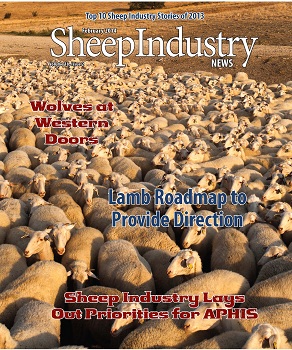
- February 2014
- President’s Notes
- Market Report
- American Lamb Industry Announces Final Roadmap
- Looking Back: Top 10 Sheep Stories of 2013
- Sheep to Shawl
- Sheep Growing Senator Weighs in on Idaho Wolf Debate
- Are Your Ewes Pregnant?
- Economist Sees Bumpy Years for U.S. Ag
- New Farm Bill May Bring Insurance Issues
- New Wool Yarn Mill Filling Niche
- College Wool Judging Teams Pick Up Skills Together at Belle Fourche Clinic
- ASI Offers Sheep Priorities to APHIS
- Utah Farm Bureau: States Can Manage Wolves
- Farmland Prices Rise, But How Long is Ride?
- Sheep Heritage Contributors
- Obituaries
To View the February 2014 Digital Issue – Click Here
Right Approach and Attitude Will Help Ranchers Succeed
Clint Krebs
ASI President
I recently attended a funeral for one of my neighbors in our very small town of 1,500 people. More than 300 people attended his service, which I found to be quite interesting, considering his ranch is probably one of the most remote ranches in the country.
His winter ranch is in the Imnaha Canyon, eight miles upstream from where it enters the Snake River, and his summer ranch is only 20 miles away and 4,000 feet higher. In other words, you go almost straight up to get there.
He started out raising sheep and later switched to cows. When he started, there were no roads to either ranch, so everything came 45 miles up the Snake River by boat or came in on a pack string of mules. He took his wool to Lewiston, Idaho by boat and he trailed his lambs 50 miles to the railroad. His neighbors might have been only 10 or 12 air miles away, but it was a day’s ride to go and visit.
What I found interesting was how this very remote individual touched so many people’s lives in a significant way so that they wanted to come to pay their last respects. Many people spoke at the service, and I would like to share what I learned of how he accomplished this.
He always looked you in the eye when he spoke, he always listened and tried to understand your opinion, even if it was different than his own. He cared about all people, regardless of if they were rich or poor, educated or not, whether they owned big ranches or worked for wages in town – and most importantly, he never left a conversation unfinished.
Road to the Roadmap
The sheep industry is now in the process of implementing the sheep industry roadmap. This was talked about at length in our just-completed convention, and there are many people who have questions.
There are many people who are very skeptical, and there are even those people who don’t think it has any value. However, there are many more people – myself included – who believe it will work if the industry comes together and makes it work. As I see it, if everyone attempts to use the skills my neighbor used to touch so many lives, we will be successful. But if we want to go down the path of always blaming another sector for our problems, without getting an understanding of their perspective, or if we want to sit at home and not pay dues to any sheep organization and yet complain that they “don’t do anything for me so I don’t need to participate,” or if we want to say the problem “only affects the large commercial operations, and doesn’t affect my smaller direct marketing program,” then we will all be to blame for erratic markets with good prices one year and prices below the cost of production next year.
Think Like a Neighbor
On that note, I need to add a couple more things about my late neighbor. He never complained about the problems he had to overcome in his life, he just went to work and fixed them. He often made comments like “how many miles of fence would we build in a lifetime if we always built one rock jack a day?” And then, when he would see his neighbor, he would ask them if they had their rock jack built.
He was asked by a friend about 20 years after he had quit running sheep – when he was running only cattle — if he thought it was better life and his answer was “No, regardless of how hard I work with the cattle it does not make very much difference, but the sheep always rewarded me for my work.”

